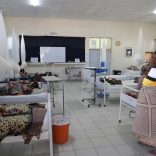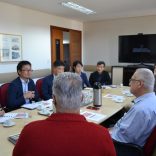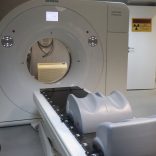Portuguese experts train 252 Mozambican doctors in diabetes diagnosis, treatment
Covid-19: Mozambican self-diagnosis application debuts with 22,000 visits

Screengrab: riscocovid19.misau.gov.mz
The Ministry of Health’s Covid-19 self-diagnosis application attracted 22,000 hits on its first day (April 8), and has recorded an average of 1,000 visits per day since then, one of the developers has told Lusa.
“The number shows that people were thirsting” for a tool that would reassure them and that is, at the same time, an ally in the prevention of the pandemic, UX Information co-founder Tiago Borges Coelho says.
The information technology company, with seven years of experience in creating “platforms with a social impact”, primarily in professional recruitment and service provision, created a ‘yes-no’ questionnaire for the MISAU website to assess the likelihood of respondents being infected.
Recommendations are provided depending on the degree of risk, and contact information for health authorities to follow up the case may be provided.
After three weeks, the digital tool has already racked up 70,000 visits from 113 different countries.
The self-diagnosis loads via any program that allows you to browse the Internet and is available directly at riscocovid19.misau.gov.mz – no installation or visits to ‘app stores’ are required.
It is also accessible from the Misau Covid-19 website at covid19.ins.gov.mz – the primary source of information about the pandemic in Mozambique, with daily updates.
The idea was born out of a ‘hackathon’ – an English term for a computer programming marathon – promoted by Mozambican technology companies and aimed at finding practical and innovative ways to fight the new coronavirus, still accessible at covid19.hack.org.mz.
The vast majority of users (86%) are from Mozambique, followed by Brazil, Portugal and South Africa.
Privacy is ensured, Tiago Borges Coelho guarantees. Gender and age are the only data collected early on, to which users may add province and district if classified as a medium or high infection risk.
The information can also help Misau predict which districts are particularly high-risk for Covid-19 infection, he adds.
The developers now want to roll out a version using the USSD technology found in some older mobile phones, by means of which services can be delivered over the mobile network without the need for an Internet connection.
The use of this older technology would suit Mozambique, where ‘smartphones’ capable of browsing the Internet represent a minority of mobile phones in use, Coelho says.
With the pandemic far from over, UX, in partnership with Misau, is continuing to explore ways to use the available data, and also analysing the information provided by the Ministry’s website to establish the most sought-after articles and articulate appropriate responses.
Tiago Borges Coelho also foresees an opportunity to create the same type of application “for other diseases, such as malaria or tuberculosis”, which still have great incidence in Mozambique.












Leave a Reply
Be the First to Comment!
You must be logged in to post a comment.
You must be logged in to post a comment.